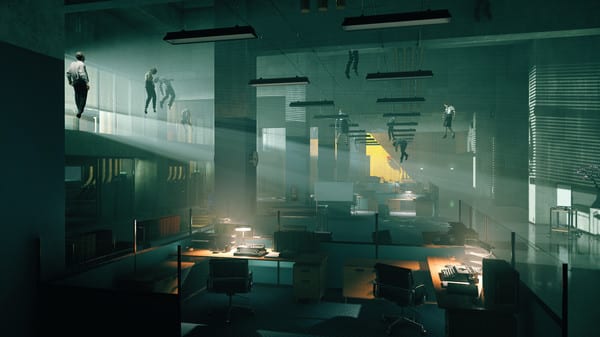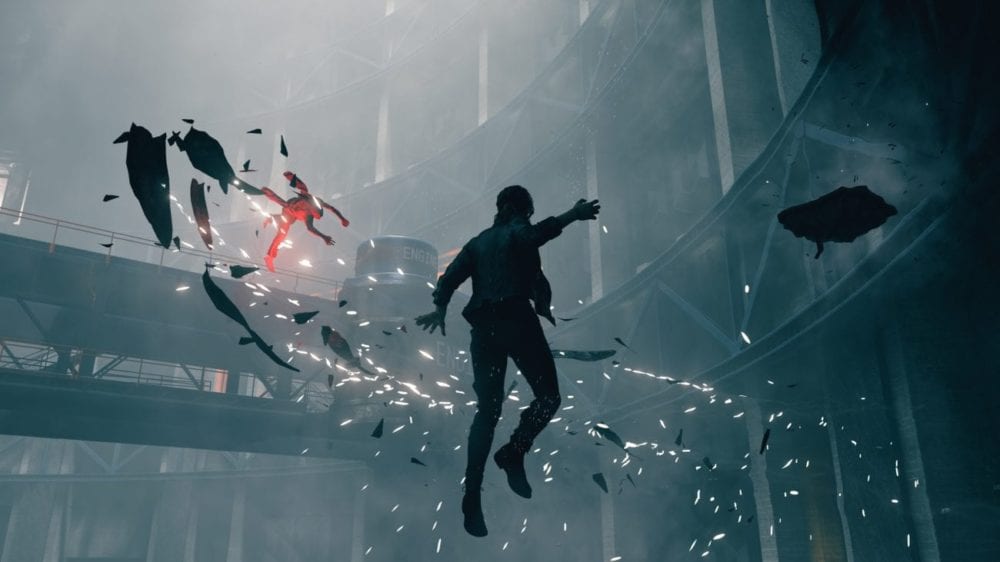We’re only about two months away from the release of Remedy’s newest third-person action game, Control.
For those who have not been keeping up with the supernatural thriller, Control throws the player into the shoes of Jesse Faden who finds herself becoming the new director of the Bureau.
During E3 2019, Twinfinite got the chance to sit down and talk to one of the creative directors as well as one of the narrative designers behind the game, Mikael Kasurinen, and Brooke Maggs, respectively.
Greysun Morales: The game is launching in about two months so how does it feel to be so close to release?
Brooke Maggs (Narrative Designer): It’s very exciting.
Mikael Kasurinen (Game Director): It’s weird. I’ve been a part of this project for three years now and it’s been a long road. It’s a new type of game from Remedy with a lot of new ideas with a different approach and structure.
There was a lot of things that we had to figure out and it’s weird to be in a moment where it’s all kind of coming together and being only two months off. I’m excited, super excited for people to get their hands on it.
Greysun: Have you guys learned any huge lessons from past Remedy games that you’re bringing into the development of Control?
Kasurinen: I think there are two major lessons. One is the feel of gameplay, the feel of combat; what it feels like to have that sense of response and immediacy.
We really wanted to double down on the feeling of having control (no pun intended). We wanted it to feel good to play as the character and whatever you wanted to happen will happen.
And the second major lesson was the amount of energy and time that went into the development of Quantum Break.
All of the little details and making sure everything made sense and all of the lore and things like that that you can find, but then the reality of the experience is seeing people just blast through the game and bypass a room in 10 seconds and ignore all of the nice little things that we built for the experience.
We spent a lot of time creating this nuanced and complex world and then people spend one evening on the game and then they’re done.
With Control, it was important that we created an experience that was more about the world itself. It’s a place where you have a protagonist and that’s Jesse, and you jump into this world together with her, and she’s an outsider to this strange world as well.
There’s a main campaign that’s a lot about her going through this experience trying to deal with The Hiss, which is a hostile supernatural force, and dealing with being the new director of the Bureau.
But it’s more about the world and that’s one plot, that’s one experience within that. But then there are other things that you can do as well: side missions, exploration, and lore, and the feeling of that world is less about blasting through a story and more about entering this world and taking time to understand what it is and how to navigate it.
This feeling and spirit –we wanted it to be there from the get-go, so it’s more about the world and players kind of figuring out their way through that. Also, we didn’t want to spoon feed the story or anything like that. We don’t want to hold the player’s hand.
We give the information at first, but it’s up to the player to figure it out and get through it.

Greysun: With Control being less linear than stuff like Quantum Break and Alan Wake, will the game still have that narrative-heavy focus or does it kind of fall to the side to make way for exploration instead?
Maggs: I don’t think so –I think it’s just as narrative-heavy but the way we’re bringing the narrative across has changed. So we have documents in the world, audio logs, a lot of environmental storytelling, but we also have side missions to help build out the side characters and more about the world.
These missions will then give you abilities to progress in the game and we also have Jesse, whose brother was taken by the Federal Bureau of Control and now she’s here to find out what happened and it’s a personal mystery for her as she becomes the new director of the Bureau.
And so she has a personal trajectory growing into her role and so that is told in the way that she is sorting out her problems. It’s still a narrative-heavy game, but the way we combined the telling of the story with the gameplay and with the mythos of telling stories, it’s different from the others.
Because Control is more open-ended, visibilities give you access to other areas and you’ll find keycards to previously locked points on the map.
You will constantly be coming back through the same spaces so there are chances that players might not get the same side missions all at the same time and that was a challenge for the narrative because we have to figure out how to make that interesting throughout the course of the game.
So if you get a different ability in mission three that a different player didn’t get, that gives you a completely different play experience between those two people. They still find the same story elements and things like that but it changes their experiences.
Kasurinen: I would like to add to that. So when you look back at Quantum Break, there’s like 90 minutes of cinematics and a lot of those cinematics were about Jack. But with Control, we wanted to focus on the drama.
In the conversation moments, you can stop and talk with characters all about the world around them and what these characters are going through and leave the kind of action and the set-pieces for the gameplay –let the player play those moments instead of us doing a massively complicated cinematic moment so that was a deliberate choice as well for us.
And a new thing we’re doing with storytelling now is adding depth and richness to the people and when you talk with them, you’re kind of getting this basic setup from them but then you can actually engage in conversation and choose what topics you would like to dive into thanks to dialogue choices.
And all of that is optional, it’s up to you if you want to do that and in our previous games we didn’t really do that. We had one path and told everything and moved along, but now we give the choice to the player. If you want to dive deep into the lore and be introduced into people’s lives, then you can do that.
Greysun: Was this idea something that you guys had from the start of development? The idea to make the game more open-ended from the get-go?
Maggs: Yeah, I think you kind of have to, don’t you? That’s a very deliberate decision. That new approach to the gameplay then makes new opportunities for telling stories. We needed to take focus on that for Control.
Greysun: So since we’re talking about discovery and the open-ended nature of the game, how long do you think the average player would take to complete the main story of the game?
Kasurinen: It’s hard to measure because it’s a large and complicated area for players to explore. Some people might want to spend a lot of time exploring and finding all of the lore but the average completion rate for those that complete a few sidequests here and there seems to fall roughly between 15-20 hours.
But you can spend a lot more time in this world if you want.
Control launches on Aug. 27 for PS4, Xbox One, and PC (via a timed exclusive on the Epic Games Store). You can look forward to our hands-on impressions on the game as well as the week goes along, so make sure to stay tuned to Twinfinite.














Updated: Jun 13, 2019 04:45 am